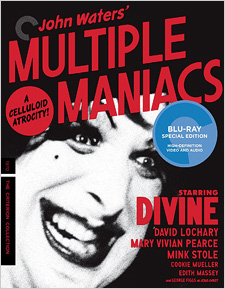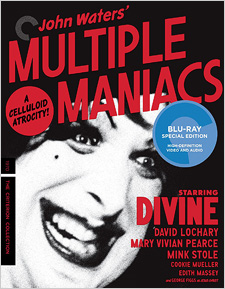Multiple Maniacs (Blu-ray Review)

Director
John WatersRelease Date(s)
1970 (March 21, 2017)Studio(s)
Dreamland/New Line Cinema/Janus Films (Criterion Collection – #863)- Film/Program Grade: D+
- Video Grade: A-
- Audio Grade: B+
- Extras Grade: B+
Review
Critiquing a film like Multiple Maniacs comes with its own set of challenges, not the least of which is discussing how unpolished it is compared to John Waters’ work much later on. One can see how the loose framework of a story about a “Cavalcade of Perversion”, a wandering group of thieves that attract curious audiences to rob them of their valuables, was a testing ground for what is roundly considered to be his most notable film from that era: Pink Flamingos. His career throughout the 1970s and early 1980s was built upon being completely tasteless. Egregiously unsatisfied with the status quo in both the cinema and in life and pushing the boundaries simply because they needed to be pushed, it explains how Multiple Maniacs came into being.
Shot in black and white with various 16mm cameras on the fly, zooming in and out for close-ups, the film’s John Cassavetes/French New Wave feel gives it in air of realism, which in truth, isn’t all that fictional to begin with. Most of the so-called depravity is actually taking place without much of a filter. It also shows you just how much the times have changed as some of it isn’t quite as provocative as it was in 1970. Regardless, Divine is still a force of nature, plowing through the movie and everyone around him like a wrecking ball of pure energy. It’s clear that Waters recognized this quality early on and used it to his advantage. To say the least, Multiple Maniacs isn’t a film that one says that they like, per se. It’s more of an experience, which is what many of the films that wind up on a boutique label like Criterion end up being.
Speaking of which, Criterion’s transfer of Multiple Maniacs features a 4K digital restoration of the film’s reversal original, which was supervised by John Waters. Although the film has admittedly been kept in non-climate controlled storage for many years, it’s still a healthy and fairly consistent presentation when it comes to the material itself. The filming mistakes remain, such as many of the out of focus shots and debris in the camera gate, but it’s miles above any of its previous home video releases. Detail is abundant in all respects, and while white levels are occasionally blown out, blacks are deep with decent delineation. Overall brightness and contrast levels are acceptable and the presentation is quite clean and stable, although some obvious damage during the car window smashing scene towards the end couldn’t be fully repaired, despite the attempt. The closing credits have also been recreated specifically for this release. The film’s soundtrack, which is an English mono LPCM track, is much of the same caliber – low budget with obvious deficiencies, but as clean and clear as it gets. Some folks might be dismayed to learn that some of the music, specifically the Elvis Presley songs, had to be replaced due to licensing issues. For me personally, it doesn’t make that much of an impact since it has Waters’ stamp of approval on it. Optional subtitles in English SDH are also included.
The supplemental material is brief, but definitely worth checking out. There’s a terrific audio commentary with John Waters; new interviews with Pat Moran, Vincent Peranio, Mink Stole, Susan Lowe, and George Figgs; The Stations of Filth, a new video essay by film scholar Gary Needham; the film’s re-release trailer; and a fold-out paper insert with an essay on the film by Linda Yablonsky, as well as the restoration details.
For an average moviegoer looking to munch on a bowl of popcorn while watching a goofy movie, Multiple Maniacs won’t be their cup of tea. It’s a reflection of, funnily enough, the innocence in how movies got made during that era. Instead of making toy models or building stop-motion puppets, this ragtag troupe of actors would get together and do whatever they were asked to do – and the more disgusting and offensive, the better. To be succinct, John Waters finds the line drawn in the dirt and leapt over it, and Multiple Maniacs is one of the finest examples of that. Criterion’s treatment of the film is quite stellar, giving it a new-found clarity and allowing us to view the decadence in all of its glorious puke-eating, armpit-licking, lobster-raping detail.
- Tim Salmons

